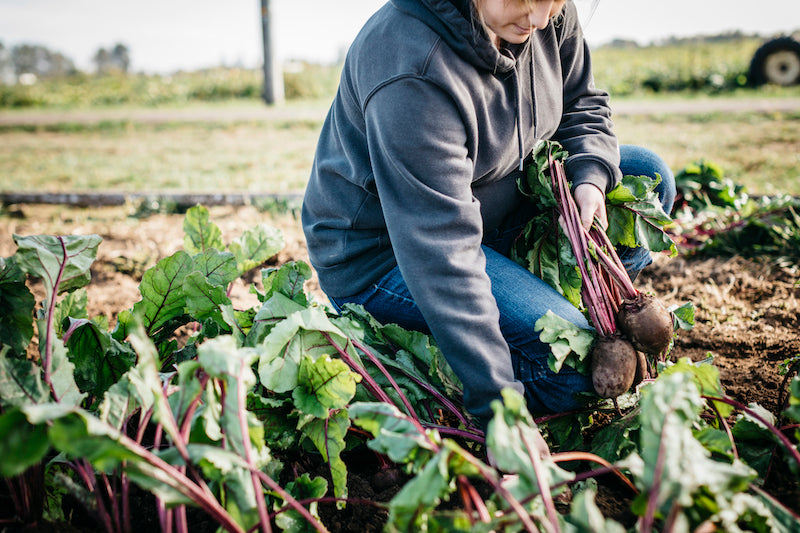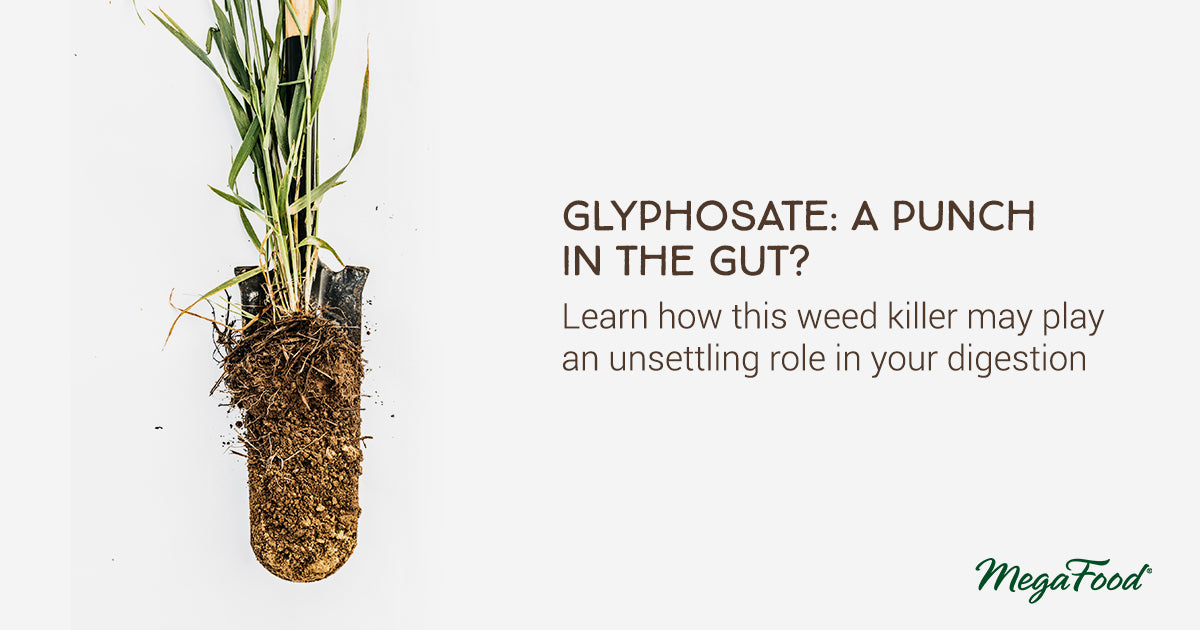Why I’m Taking a Stand Against Glyphosate

Robert U Craven, MegaFood CEO | Nov. 2018
In these divisive times, I wonder if it’s possible to appeal to a broad spectrum of people about a topic as basic as the future we leave to our kids?
I’m pretty well qualified to give it a try. Having grown up in a conservative, blue-collar part of Tampa, FL., I went to college in Florida and am a proud Gator. Over the years, I knew a lot of people who went into the military, some for careers. Like many people from the South, I am a person of faith who believes he was put on this planet for a purpose. There’s a proud strain of individualism and conservatism running through me.
Most of my career has been in natural products, an industry I feel passionate about, and an industry that generally attracts other people who are passionate about health and wellness. They tend to take a progressive stand on many issues, from politics to the environment, and look to the government to help create change. So, there’s another proud strain running through me, one of idealism and commitment to the collective good.
Today, if you analyzed my Facebook friends, you’d discover a pretty even fifty-fifty split of “blue” and “red” people.
Well, here goes.
MegaFood, the company for which I’m proud to serve as CEO, has taken a stand against the use of glyphosate as a herbicide for basic food crops. We’re taking this stand because we don’t want to compromise the health of people and the soil that sustains them, and we believe that glyphosate does both. In addition, we want a better future for more farmers—a future where they aren’t forced to pay for more and more chemical inputs to the extent they cannot make a living outside large, industrial farming businesses.
This position accords in every possible way with MegaFood’s mission to change the world, starting with food. And, on a personal level, it represents my deepest feelings about individual responsibility— in this case, the need to speak up when confronted by a mountain of data telling me that there’s too much of this herbicide in the soil and in me. The data wasn’t written by any special interest organization I’m aware of. To the contrary, it’s being done independently by scientists in universities and nonprofit organizations around the world.
They’re not out to argue extreme points, for example, by suggesting that the slightest whiff of herbicides such as glyphosate will make you drop dead.
However, study by study, survey by survey, and report by report, a sober body of evidence is surfacing showing that glyphosate-based herbicides are everywhere, including in our bodies, in newborn babies, and the soil, and that the toxin is likely most harmful when taken in very low doses over long periods of time.
For example:
1. As the main active ingredient in Monsanto’s bestselling herbicide Roundup™, approximately 250 million pounds of glyphosate-based herbicides were sprayed on food crops, lawns and home gardens across the country, according to the 2016 U.S. Geological Survey.
2. The number of surveyed American adults with detectable glyphosate in their bodies was 12 percent between 1993 and 1996. Between 2014 and 2016, that figure rose to at least 70 percent, excluding teens and children.
3. In 1993, the EPA’s legal limit on glyphosate residues was 0.1 parts per million (ppm). Today, it is 30 ppm, more than 300 percent higher. MegaFood and other industry leaders have petitioned the EPA to return to the more protective standard of 1993.
4. In March 2015, 17 experts from 11 countries met at the World Health Organization’s International Agency for Research on Cancer (IARC) in Lyon, France to assess the glyphosate and other herbicides as causes of cancer. They concluded that glyphosate was “probably carcinogenic to humans.”
5. In response to the IARC’s assessment, Monsanto struck back by engaging a consulting firm to ghostwrite an article about Roundup’s health effects published in the scientific journal Critical Reviews in Toxicology. The journal later issued a rare “expression of concern” over Monsanto’s lack of transparency in authorship.
6. Environmental Science and Pollution Research published findings indicating that glyphosate-based herbicides had toxic effects on soil fungi and might impair soil ecosystems at doses far below the recommended agricultural application rate.
7. A new study from Poland has shown how the herbicide Roundup 360 Plus causes DNA damage in human blood cells at low concentrations.
I could go on and on with the citations, but you get the point. I’m bothered that we have got to a place where farming depends on the use of chemicals designed by companies to kill everything but the crops genetically engineered by these same companies to resist the toxins. I’m bothered by the sheer quantity of the chemicals on the ground and in our food. We got here, and I mean all of us, by adapting to an agricultural practice that values short-term profits over long-term sustainability. The time has come—has already come and threatens to pass us by—to when changing direction must be our priority.

It’s not a “red state” or “blue state” thing. I’m not a professional busybody; nor am particularly interested in telling people how to live their lives. I just don’t want billions of tons of toxins in my food, period. And I certainly don’t want them in my kids’ food, either.
Science told us all about DDT and, eventually, we listened. Now, it’s telling us a related, but even more powerful, story about glyphosate and its role in unsustainable farming practices that impoverish the soil and us. Please have a look at this four-minute video on regenerative agriculture. I love the last line: “The way we grow our food, fiber, and fuel either puts carbon up in the air or pulls it down into the ground.”
Seems reasonable—makes a lot of sense to me.
We at MegaFood want do our part to pull more carbon back into the ground where it can fortify the soil’s microbiome, necessary for healthy plant and animal life, and in turn, help us achieve our mission. Yes, we can mitigate glyphosate’s impact, somewhat, by sourcing our ingredients from like-minded farmers, advocating for organic and regenerative farming practices, and ensuring our product line is certified glyphosate free. But we have to do more.
And that, some 1,000 words later, is why we’re asking for your signature to help us and our corporate partners petition the EPA to ban glyphosate as a drying agent or “desiccant” on oats, which form a staple of the American diet—especially for kids in the form of cereal. I’ve got to think this is something we can work on together, regardless of where we live or how we vote.
Did I convince you? Will you sign the petition?


Under Robert Craven’s leadership, MegaFood has focused on making a difference through transparency, unwavering commitment to high quality, and bold storytelling on behalf of the company, the natural products industry, and consumers around the world.



Leave a comment
This site is protected by hCaptcha and the hCaptcha Privacy Policy and Terms of Service apply.